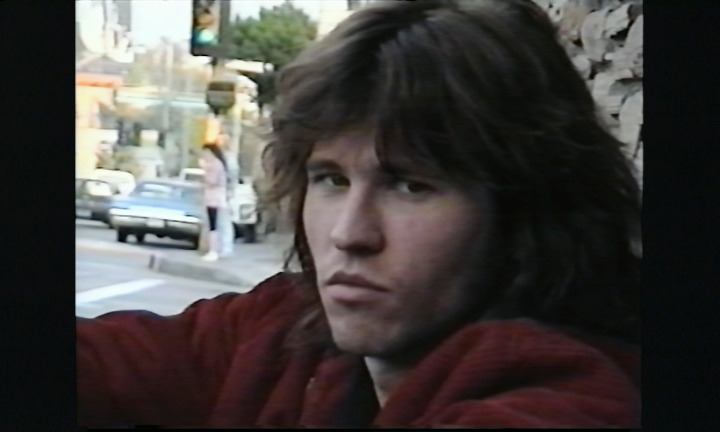He emerged on the scene with implausibly good looks, the stuff of matinee idol dreams. He studied in one of the most prestigious acting schools in New York, did plenty of theatre, and was wooed by Hollywood. He was considered a problem on many sets, would do films that were critically acclaimed or sometimes do quickies just for the money. There was a superhero film along the way, a western, gangster films, and more. As age caught up with him, his looks faded but there was still plenty to admire about what he could accomplish when given the chance to steer his talent around the many self-inflicted obstacles of temperament.
I’m speaking, of course, of Marlon Brando, who plays a significant role in Val, the semi-autobiographical film about actor Val Kilmer. In many ways, Brando is the shadow that looms over Kilmer’s life and career, a person who only a generation before climbed higher heights than perhaps any actor of the 20th century, only to tumble into the stuff of gossip rags and whisper campaigns. While Brando’s route from Strasburg to superstardom was more direct, Kilmer in the 1980s saw Julliard as his entrée into the world of New York theatre, bringing out not only his talents on the stage but also writing scripts for himself and his fellow players.
Kilmer didn’t get Streetcar Named Desire. Instead, he was lured by Top Secret and Real Genius, and then found an iconic turn as the antagonist to another rising actor, Tom Cruise, in Tony Scott’s deliciously, homoerotic and fabulously fascistic fantasy Top Gun. Cruise would go on to collaborate with Scorsese and Kubrick, while Kilmer would have a fine career, but never at the level of those with whom he habitually worked.
From early in his career, Kilmer would obsessively document his life. A self-confessed early adopter, he’d schlepp video cameras onto set. Much of Val is comprised of what ostensibly are home movies from a very popular person with a life in which quotidian tasks seem cooler when done by a Hollywood star. Leo Scott and Ting Poo have helped shape the mountain of footage into an efficient telling of Kilmer’s early days, from a tragic early life where he lost his brother in a freak accident, through to his time on stage, right through to the latter part of his career.
Kilmer’s voice was literally taken from him following surgery for cancer, and so it falls on his son Jack’s shoulders to read the story of his father. The timbre of their voices is quite similar, and rather than hiding the fact that Val Kilmer does not narrate his own story, we witness some of the recording, including moments when Jack rightly recoils at some of the awkward things he’s tasked to communicate.
It would be far too easy for a film of this nature to be either a straight up sob-story about an actor who befell a serious illness, or some simply a fairy tale of redemption after a life well lived. To the credit of both filmmakers and the central participant himself, Val manages to commemorate what has transpired during a remarkable run while still showing the many challenges and complications that occurred along the way.
Kilmer’s notoriety for perfection on set is addressed directly from those that worked with him, and it’s here that the connection to his acting idol is made all the more overt. With footage Kilmer captured on the notoriously toxic set of The Island of Dr. Moreau, we see not only the bloated presence of Brando unable to steer things his way, but we also witness a genuine tenderness between the late icon and Kilmer. In the midst of the tumult of that set, the two seemed to find a certain peace simply in each other’s presence.
These tiny, exceptional moments see the documentary truly shine. Couple this with some heartbreaking scenes at a Tombstone screening and an autograph session that truly takes a turn for the worse, and one can witness directly some of the more miserable aspects to maintaining a career based on past glories. Yet at the same time there’s a spark in Kilmer’s eyes, and even when doing things as seemingly banal as hanging out with his neighbourly daughter, or cutting up magazines to craft collages, you’re drawn into his world in such a welcoming way that it’s difficult to find anything to complain about.
In many ways, Val is a testament to one man’s life, but it’s also a tribute to a type of character who seems to both thrive and falter in equal measure when struggling to create remarkable art for an audience. Val helps contextualize Kilmer’s role in Hollywood history, but it provides more insight into legends like Brando as well, which makes the journey one of great depth and impact.
While Kilmer continues to navigate his current health situation, and we can share in his grief about what never came to be and what was taken away, the film tips towards utter joy when reflecting about what was caught on camera: those fleeing, flickering moments that forever immortalize a young, smirking actor. It evokes Kilmer’s matinee idol good looks but the mind to strive for something deeper. In many ways, Val serves as an extension of the actor’s drive to create. As a furtherance of his craft, and as deep insight into his character, it’s one of the finest biographical documentaries to come about in some time.
Val premiered at the Cannes Film Festival and debuts on Amazon Prime August 6.













